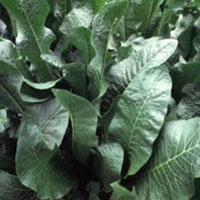Horseradish
 © Steven Foster
© Steven FosterParts Used & Where Grown
Horseradish likely originated in Eastern Europe, but today it is cultivated worldwide. The root is used as both food and medicine.
- Reliable and relatively consistent scientific data showing a substantial health benefit.
- Contradictory, insufficient, or preliminary studies suggesting a health benefit or minimal health benefit.
- For an herb, supported by traditional use but minimal or no scientific evidence. For a supplement, little scientific support.
Our proprietary “Star-Rating” system was developed to help you easily understand the amount of scientific support behind each supplement in relation to a specific health condition. While there is no way to predict whether a vitamin, mineral, or herb will successfully treat or prevent associated health conditions, our unique ratings tell you how well these supplements are understood by the medical community, and whether studies have found them to be effective for other people.
For over a decade, our team has combed through thousands of research articles published in reputable journals. To help you make educated decisions, and to better understand controversial or confusing supplements, our medical experts have digested the science into these three easy-to-follow ratings. We hope this provides you with a helpful resource to make informed decisions towards your health and well-being.
This supplement has been used in connection with the following health conditions:
| Used for | Amount | Why |
|---|---|---|
Bronchitis | Refer to label instructions | Horseradish contains antibacterial substances and has mucus-clearing properties that are beneficial for people with bronchitis. |
Common Cold and Sore Throat | Refer to label instructions | Horseradish has antibiotic properties, which may account for its usefulness in easing throat and upper respiratory tract infections. |
Sinusitis | Refer to label instructions | Horseradish is an herb used traditionally as a mucus-dissolver. |
Urinary Tract Infection | Refer to label instructions | The volatile oil of horseradish has been shown to kill bacteria that can cause UTIs. |
Traditional Use (May Not Be Supported by Scientific Studies)
Horseradish, known for its pungent taste, has been used as a medicine and condiment for centuries in Europe. Its name is derived from the common practice of naming a food according to its similarity with another food (horseradish was considered a rough substitute for radishes).
Horseradish was utilized both internally and externally by European herbalists. Applied to the skin, it causes reddening and was used on arthritic joints or irritated nerves. Internally, it was considered to be a diuretic and was used by herbalists to treat kidney stones or edema. It was also recommended as a digestive stimulant and to treat worms, coughs, and sore throats.1
Copyright © 2024 TraceGains, Inc. All rights reserved.
Learn more about TraceGains, the company.
The information presented by TraceGains is for informational purposes only. It is based on scientific studies (human, animal, or in vitro), clinical experience, or traditional usage as cited in each article. The results reported may not necessarily occur in all individuals. Self-treatment is not recommended for life-threatening conditions that require medical treatment under a doctor's care. For many of the conditions discussed, treatment with prescription or over the counter medication is also available. Consult your doctor, practitioner, and/or pharmacist for any health problem and before using any supplements or before making any changes in prescribed medications. Information expires December 2024.
